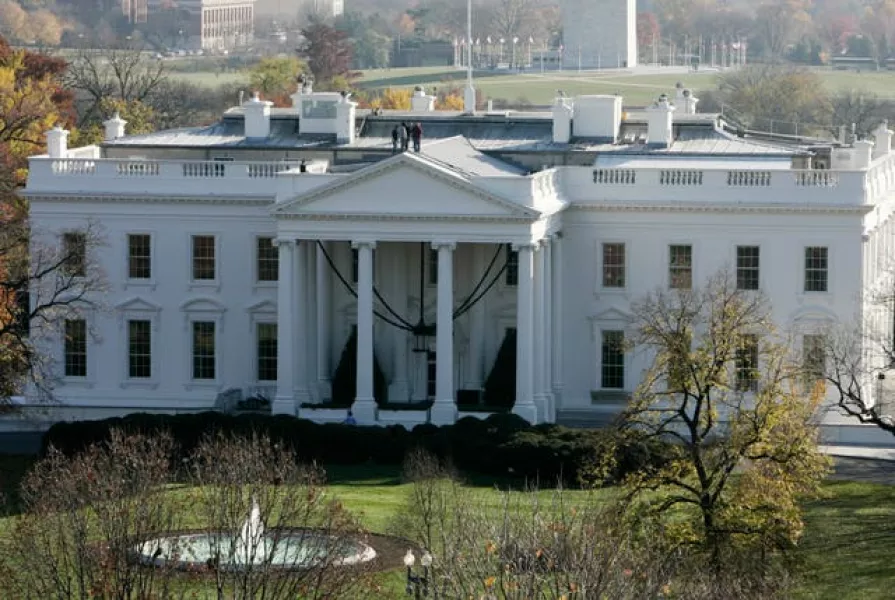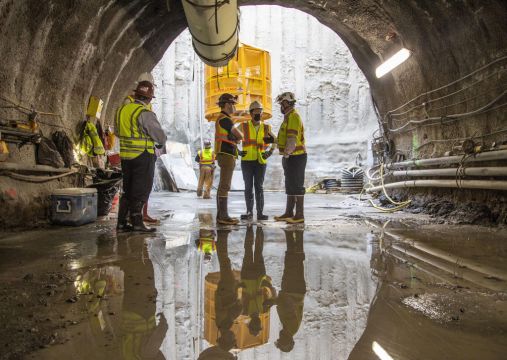Plans for an ambitious American infrastructure deal have been thrown into serious doubt after Republican senators rejected US president Joe Biden’s reduced proposal of 1.7 trillion dollars (£1.2 trillion).
While talks have not collapsed, Republicans said “vast differences” remain, and the downbeat assessment is certain to stoke fears from Democrats that time is slipping away to strike a deal.
The president’s team is holding to a soft Memorial Day deadline to determine whether a compromise is within reach. Scepticism had been rising on all sides over the lack of significant movement off Mr Biden’s 2.3 trillion dollar (£1.6 trillion) plan, or the Republicans’ proposed 568 billion dollar (£400 billion) alternative.
White House press secretary Jen Psaki said the proposal exhibits a willingness to come down in size over the final sum, as talks got under way between key cabinet secretaries and Republican senators.

But after the hour-long meeting, the Republicans quickly rejected the new approach as “well above the range” of a proposal that could win bipartisan support.
The two sides “seem further apart” than when negotiations began, according to a statement from an aide to Republican senator Shelley Moore Capito.
The White House and the Republican senators have been in talks ever since Mr Biden met with a core group of Republican negotiators over the possibility of working together on an infrastructure plan.
The White House dispatched the transportation and commerce secretaries and top aides to Capitol Hill to meet with the Republicans earlier this week, and they had a follow-up video call on Friday.
According to a memo obtained by The Associated Press, the administration’s new approach is cutting more than 550 billion dollars (£388 billion) from the president’s initial offer.

But the memo makes clear Mr Biden is not interested in the Republicans’ idea of having consumers pay for the new investments through tolls, fuel taxes or other fees.
Instead, the administration is sticking with his proposal to raise corporate taxes to pay for the new investment, which is a red line for Republicans.
“Our approach should ensure that corporations are paying their fair share,” said the memo from the administration’s negotiators to the Republican senators.
But Republicans dismissed the new White House offer as “very marginal movement” on the top line without much difference in policy, according to a Republican insider. The new offer was “disappointing”, the aide said.
Securing a vast infrastructure plan is Mr Biden’s top priority as he seeks to make good on his campaign pledge to “build back better” in the aftermath of the coronavirus crisis and the economic churn from a shifting economy.

With narrow Democratic majorities in the US house and senate, the president is reaching out to Republicans for support on a potentially bipartisan approach rather than relying simply on his own party to muscle the proposal through.
Republicans are adamantly opposed to Mr Biden’s proposed corporate tax increase to pay for the package, refusing to undo the 2017 tax cuts, the party’s signature domestic accomplishment under Donald Trump.
They reduced the corporate rate from 35% to 21%. Mr Biden proposes lifting the corporate tax to 28%.
Ms Psaki said the new proposal drops the president’s proposed expenditures on broadband as well as roads, bridges and other major investments to meet the Republicans’ lower level.
She said the administration’s proposal also involved “shifting investments in research and development, supply chains, manufacturing and small business” out of the infrastructure talks, since they could be considered elsewhere.
But Ms Psaki said the president’s team is still pushing for investments in new veterans hospitals, rail projects and green energy investments to fight climate change that Republicans have excluded from their offers.
In all, the White House cut broadband from $100 billion (£70.5 billion) to 65 billion dollars (£45 billion), as Republicans proposed. It also reduced road and bridges spending by 39 billion dollars (£27 billion), from 159 billion dollars (£112 billion) to 120 billion dollars (£84 billion), to move closer to the GOP’s proposal of 48 billion dollars (£33.8 billion) in new funds.
Removing the research and development funds would cut a whopping 480 billion dollars (£338 billion), the aides said.
The White House characterised the Republicans’ initial 568 billion dollar “Road map” proposal as amounting to an estimated 175 billion dollars (£123 billion) to 225 billion dollars (£158.7 billion) in “new investment, above current levels congress has traditionally funded”, according to the memo.
The Republican senators have not publicly disclosed their latest offer.







